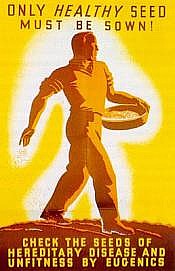Maga’s era of ‘soft eugenics’: let the weak get sick, help the clever breed
By Derek Beres,
The Guardian
| 05. 04. 2025
English polymath Francis Galton formulated the concept of eugenics in 1883. Inspired by animal breeding, Galton encouraged people with “desirable” traits to procreate while discouraging or preventing those with “undesirable” traits from doing the same. As social and intellectual qualities were hereditarily “fixed”, he thought some groups were naturally superior. Galton constructed a racial hierarchy, with white Europeans at the top.
Eugenics has since played out in varying, always tragic ways. Attempted genocides and forced sterilization are first to mind, though the 20th century brought about the concept of soft eugenics: non-coercive methods of reducing certain conditions through individual choice and medical advice. Popularized in Nancy Stepan’s 1991 book, The Hour of Eugenics, “soft” eugenics is accomplished by indirect, environmental, and educational interventions while “hard” eugenics is marked by direct biological interventions (such as sterilization). The term has since been expanded in discussions of genetic technologies, prenatal screenings, and physical fitness.
Enter Robert F Kennedy Jr, the US secretary of health, who regularly laments over the “back then” of his youth when he says that diabetes and autism...
Related Articles
By Roni Caryn Rabin, The New York Times | 01.22.2026
The National Institutes of Health said on Thursday it is ending support for all research that makes use of human fetal tissue, eliminating funding for projects both within and outside of the agency.
A ban instituted in June 2019 by...
By Mike McIntire, The New York Times | 01.24.2026
Genetic researchers were seeking children for an ambitious, federally funded project to track brain development — a study that they told families could yield invaluable discoveries about DNA’s impact on behavior and disease.
They also promised that the children’s sensitive...
By Phil Galewitz, NPR | 01.20.2026
Serenity Cole enjoyed Christmas last month relaxing with her family near her St. Louis home, making crafts and visiting friends.
It was a contrast to how Cole, 18, spent part of the 2024 holiday season. She was in the hospital...
By Dan Barry and Sonia A. Rao, The New York Times | 01.26.2026
Photo by Gage Skidmore from Peoria, AZ, United States
of America, CC BY-SA 2.0, via Wikimedia Commons
Late last month, a woman posted a photograph on social media of a purple hat she had knitted, while a black-and-white dog...




